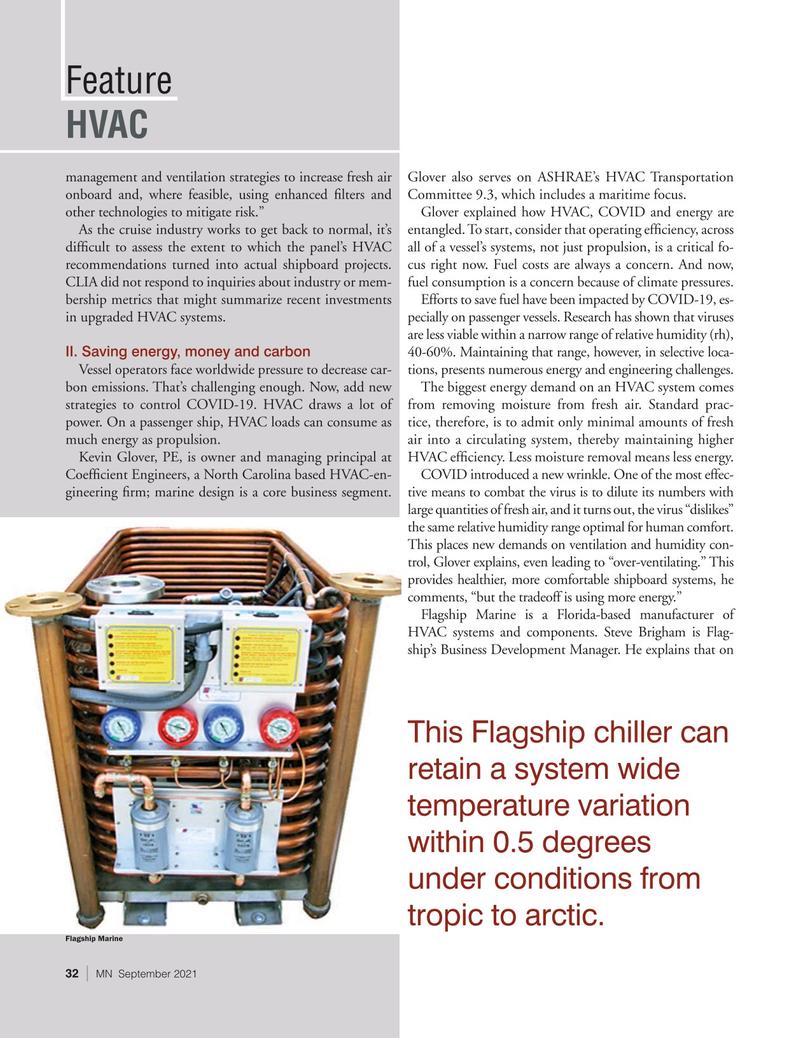
Page 32: of Marine News Magazine (September 2021)
Shipbuilding & Repair
Read this page in Pdf, Flash or Html5 edition of September 2021 Marine News Magazine
Feature
HVAC management and ventilation strategies to increase fresh air Glover also serves on ASHRAE’s HVAC Transportation onboard and, where feasible, using enhanced ? lters and Committee 9.3, which includes a maritime focus.
other technologies to mitigate risk.” Glover explained how HVAC, COVID and energy are
As the cruise industry works to get back to normal, it’s entangled. To start, consider that operating ef? ciency, across dif? cult to assess the extent to which the panel’s HVAC all of a vessel’s systems, not just propulsion, is a critical fo- recommendations turned into actual shipboard projects. cus right now. Fuel costs are always a concern. And now,
CLIA did not respond to inquiries about industry or mem- fuel consumption is a concern because of climate pressures.
bership metrics that might summarize recent investments Efforts to save fuel have been impacted by COVID-19, es- in upgraded HVAC systems. pecially on passenger vessels. Research has shown that viruses are less viable within a narrow range of relative humidity (rh),
II. Saving energy, money and carbon 40-60%. Maintaining that range, however, in selective loca-
Vessel operators face worldwide pressure to decrease car- tions, presents numerous energy and engineering challenges.
bon emissions. That’s challenging enough. Now, add new The biggest energy demand on an HVAC system comes strategies to control COVID-19. HVAC draws a lot of from removing moisture from fresh air. Standard prac- power. On a passenger ship, HVAC loads can consume as tice, therefore, is to admit only minimal amounts of fresh much energy as propulsion. air into a circulating system, thereby maintaining higher
Kevin Glover, PE, is owner and managing principal at HVAC ef? ciency. Less moisture removal means less energy.
Coef? cient Engineers, a North Carolina based HVAC-en- COVID introduced a new wrinkle. One of the most effec- gineering ? rm; marine design is a core business segment. tive means to combat the virus is to dilute its numbers with large quantities of fresh air, and it turns out, the virus “dislikes” the same relative humidity range optimal for human comfort.
This places new demands on ventilation and humidity con- trol, Glover explains, even leading to “over-ventilating.” This provides healthier, more comfortable shipboard systems, he comments, “but the tradeoff is using more energy.”
Flagship Marine is a Florida-based manufacturer of
HVAC systems and components. Steve Brigham is Flag- ship’s Business Development Manager. He explains that on
This Flagship chiller can retain a system wide temperature variation within 0.5 degrees under conditions from tropic to arctic.
Flagship Marine 32 | MN September 2021

 31
31

 33
33
